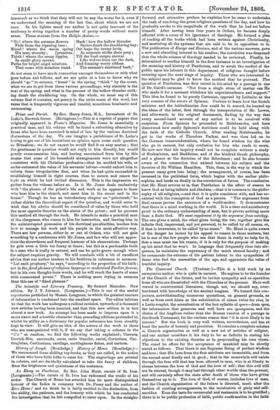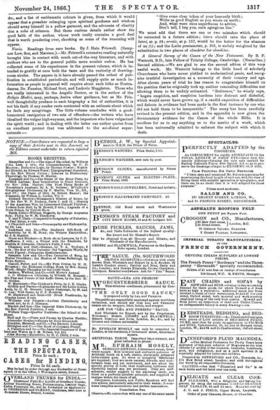The Universal Church. (Trubner.)—This is a bold work by an
anonymous author, who is quite in earnest. He aspires to be the founder of the Church of the future, and he invites sympathy and co-operation from all who are dissatisfied with the Churches of the present. He is well versed in controversial literature, though not, we should say, over- burdened with knowledge of the ancient tongues. We hazard this con- jecture, notwithstanding numerous quotations, on general gronnds, as well as from, such hints as the substitution of vinum twice for vino, in a Latin couplet, the accentuation of the last syllable of opera—from opus, the information that generous and well born are synonymous, and the choice of the Anglican rather than the Roman version of a passage in the Greek Testament, for the curious reason that "it is moat likely to be correct." But the book is very well written, nevertheless, and has at least the merits of honesty and precision. It contains a complete Behan° or Church organization as well as a new set of articles of religion, and our author considers it his duty to be as definite in stating his objections to the existing theories as in propounding his own views. The creed he offers for the acceptance of mankind may be shortly stated as follows. That there is one Supreme Being of perfect wisdom and love ; that His laws from the first attribute aro immutable, and from the second must finally end in good ; that in the meanwhile evil exists through the free will that has been allowed to man, who is at liberty to choose between the love of God and the love of self ; that this evil will not be eternal, though it raaylast through other worlds than the present, and will certainly affect the state after death of those who have given themselves up to it. The love of God, of course, includes love of man, and the Church organization of the Ware is directed, much after the fashion of existing arrangements, to the inculcation of piety and self- sacrifice. Even the taste for ceremonial and vestments is to be gratified ; there is to be public profession of faith, public confirmation in the faith
ac., and a list of emblematic colours is given, from which it would appear that a preacher enlarging upon spiritual goodness and wisdom should array himself in a yellow garment, and the advocate of charity don a robe of crimson. But these curious details rather show the good faith of the author, whose work really contains a good deal that is worth pondering over, shocking as some of the reasoning will
appear.































 Previous page
Previous page